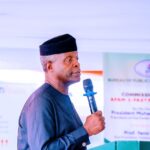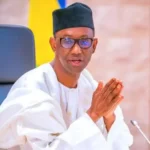Experts and other stakeholders have call for legislation to enforce political debates for all candidates, especially presidential, governorship and legislative positions to boost choice and good governance in the country.
They made the call yesterday in Abuja at 12th year anniversary symposium of Enough is Enough (EiE) Nigeria, a civil society organisation, with the theme ‘Debates and Democracy’.
- How rotational presidency, VAT collection debates prelude 2023 politicking
- Insecurity: Enough is enough, youths tell FG
Speaking at the event the Minister of Works and Housing, Babatunde Fashola, said that he earned political relevance through debates against his opponents.
According to the former Lagos State Governor, he joined the governorship race in 2007 as a rookie but made himself known through debates against his opponents.
He said he participated in no less than 18 debates in the run up to his first election in 2007 and his re-election in 2011 as governor of the state.
He also recounted that he decided to vote for Moshood Abiola against Bashir Tofa in the 1993 presidential election after watching their debate.
“In 2007, people didn’t know who I was politically. People who knew me were the judges and the lawyers in the court, and they said where did you bring this candidate from. And it was clear to me that the only way I was going to connect to the people was during that debate,” Mr Fashola said in one of the panel sessions.
The minister underscored the need to properly engage vice-presidential candidates in debates owing to the economic, social and security roles they play in every government.
He said, “On election day, what you’re probably likely to see is a ballot paper with the signs, symbols, possibly the names of the candidates, but doesn’t tell you what they do about your life, what they care about, how you feed them, doesn’t tell you whether they are God-fearing, whether they have empathy.
“So, it is platforms like this that help you test ahead of making a choice, what kind of persons you are entrusting the most serious jobs either in your local government, your state or in your country. And that became very defining for me as a much younger person in 1993.”
He added that the biggest single item in the economy space in the country then was the price of petrol and that if you asked people before that election, it was thought that it was difficult for MKO to defeat Tofa given the general perception.
“But on that night, it became clear to Nigerians, who watched the debate that the most important issue about them, only one of the candidates had the consciousness about it. And what was normal for them was to gravitate towards that candidate. And I remember that was why I went out to vote for MKO that day.
“If you do a survey, even in the north, where it was thought that MKO didn’t have a link, the price of fuel was a major issue, and it probably tilted the election. This is one of the many processes for making informed choices,” he said.
Also, the keynote speaker and Executive Director of the Commission on Presidential Debates (CPD), Janet Brown, reiterated the importance of debates, as it not only presents a level-playing ground for all candidates, and also allows citizens to understand each candidate’s plan and ask pertinent questions.
Brown who joined the session virtually, said that given the peculiarity of Nigeria’s democracy and the attitude of her political class, such law compelling political debate would re-enforce the value system in the polity.
She advised that the culture of political debate must be allowed to evolved by stakeholders and the media owed the citizenry the responsibility to hold public office holders accountable.
Brown expressed the need for continued political information due to the fledgling democratic structures and poor media penetration in developing countries like Nigeria, where citizens often vote for candidates with little knowledge of their policy stances, qualifications, previous performance, or potential remit.
On their parts, the Executive Secretary of Nigerian Elections Debate Group (NEDG), Edward Emessiri; a veteran TV host, Ngozi Alaegbu; and a former presidential spokesman, Mr. Olusegun Adeniyi, who served as a moderator of the session, were unanimous in backing electoral debates.
Speaking earlier, Executive Director of EiE, Yemi Adamolekun, said election debates will promote a culture of good governance and public accountability of elected officers across boards.
“Over the last decade, we have hosted or co-hosted 25 debates of different formats, presidential, governorship, local government chairmanship, youth members of political parties and town hall meetings for legislators.
“I believe EiE has hosted/co-hosted more debates than any other civil society organisation in Nigeria,” she said.
According to her, in the political context, debates provide a platform where citizens can listen to candidates, ask questions, and make informed choices on who they will elect to govern them.
“It (debates) shapes campaigns and prepares serious candidates for governance. In some cases, debates can help reduce political tensions, as the optics of the hug or handshake before and after the debate should communicate to supporters that we can disagree without being disagreeable.
“During a debate, a candidate’s statements, policy positions and campaign promises become public record that civic groups and the media should use to hold them accountable. EiE believes in the intrinsic value of debates as a mechanism to deepen democratic ideas and we are committed to hosting/co-hosting as many as we can to further that objective.”

 Join Daily Trust WhatsApp Community For Quick Access To News and Happenings Around You.
Join Daily Trust WhatsApp Community For Quick Access To News and Happenings Around You.


